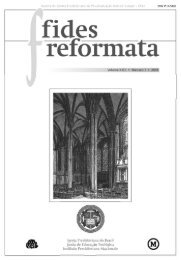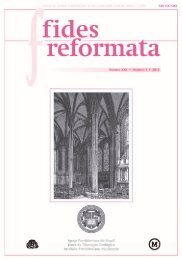Fides 22 N2
Um publicação do Centro Presbiteriano de Pós-graduação Andrew Jumper.
Um publicação do Centro Presbiteriano de Pós-graduação Andrew Jumper.
You also want an ePaper? Increase the reach of your titles
YUMPU automatically turns print PDFs into web optimized ePapers that Google loves.
ELIAS MEDEIROS, THE REFORMERS AND MISSIONS<br />
commandment, and, by thus giving to the newly awakened life of faith a missionary<br />
direction, brought about the present age of missions.” 36 That was precisely<br />
what the reformers were praying and waiting for. Such commandments had<br />
never been forgotten by the reformers, especially John Calvin and the Puritans<br />
in general. This subject has been extensively dealt with by scholars such as De<br />
Jong, Rooy, and Murray. 37<br />
Latourette comes to the same conclusion, but there is a nuance in his report<br />
that distinguishes it from the underlined critiques of Warneck. Latourette understands<br />
that the Great Century of Mission was preceded by a constant attempt<br />
of the Protestants to evangelize the world. He does not say, as Warneck does,<br />
that only now the “missionary commandment” was taken seriously by the Protestants.<br />
He instead uses terms like “more vigorous” or “increased” to describe<br />
the development of the expansion of the Protestants. He, therefore, assumes that<br />
such initiatives had been present since the beginning, even at the time of the Reformation.<br />
Latourette had always been very condescending toward the reformers<br />
and their involvement and commitment to the spread of the gospel worldwide<br />
during the Reformation. 3389 Latourette believes that, with the eighteenth century<br />
Protestant revival (awakening), “interest of Protestants in extending their faith to<br />
non-Christian peoples increased with each century and did not, like that of the<br />
Roman Catholics, have a brilliant rise followed by a discouraging and prolonged<br />
decline.” 39 Latourette seems to assume that the desire and attempts to evangelize<br />
the world were already present during the Reformation.<br />
Latourette also states that “as the eighteenth century wore on religious<br />
awakenings brought new life to British Protestantism, both in the British Isles<br />
and in North America.” 40 He becomes more explicit, however, regarding the<br />
role and the place of the awakenings in world evangelization when he concludes<br />
in his fourth volume that “the new Protestant missionary movement was<br />
largely the outgrowth of the awakenings of the seventeenth and especially of<br />
the eighteenth century and was to be reinforced by the many revivals of the<br />
nineteenth century.” Also significant is his statement that “it was chiefly an<br />
36 Ibid.<br />
37 See James A. De Jong’s doctoral dissertation, As the Waters Cover the Sea: Millennial Expectations<br />
in the Rise of Anglo-American Missions 1640-1810 (Laurel: Audubon Press, 2006), original<br />
publication by J. H. Kok N. V. Kampen, Netherlands, 1970; Sidney H. Rooy’s doctoral dissertation,<br />
The Theology of Missions in the Puritan Tradition: A Study of Representative Puritans: Richard Sibbes,<br />
Richard Baxter, John Eliot, Cotton Mather & Jonathan Edwards (Laurel: Audubon Press, 2006), original<br />
publication by Eerdmans, 1965; and Ian H. Murray, The Puritan Hope: Revival and the Interpretation<br />
of Prophecy (Edinburgh: The Banner of Truth, 1991), first published in 1971.<br />
38 See chapter 5 of my Ph.D. dissertation.<br />
39 Kenneth Latourette, A History of the Expansion of Christianity: Three Centuries of Advance<br />
A.D. 1500-1800, Vol. 3 (New York and London: Harper & Brothers Publishers, 1939), 50. Bold added.<br />
40 Ibid., Vol. 3, 49.<br />
148




